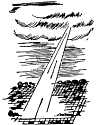|
We are told our petroleum resources are being reduced at an alarming rate; that in 15 or 20 years we will have used up all our reserves. Then we won't be able to get gasoline. What are we going to do about it? If we trace petroleum back to its origin perhaps we can better understand the problem. Petroleum, as you know, is supposed to be formed by the decomposition of vegetation millions of years ago. So all the energy that comes from oil is stored sun energy from these past ages. It is well known that we can produce gasoline from coal - another form of stored sun energy; and if we keep the sun in mind as the original source of energy, it is easy to see that the real problem is how to obtain our fuel directly from the source.  The sun grows all vegetation, evaporates the water that falls as rain
and furnishes the energy for the winds. During the three summer months
in Central Ohio the solar energy falling on just one acre of ground, if
it could be retained, is enough to furnish power for 300 to 400
automobiles. The growing plant fixes only a small part of this energy.
I am positive that we can develop special processes of condensing and
storing some of the unlimited energy of the sun to supply fuel for our
transportation needs.
The sun grows all vegetation, evaporates the water that falls as rain
and furnishes the energy for the winds. During the three summer months
in Central Ohio the solar energy falling on just one acre of ground, if
it could be retained, is enough to furnish power for 300 to 400
automobiles. The growing plant fixes only a small part of this energy.
I am positive that we can develop special processes of condensing and
storing some of the unlimited energy of the sun to supply fuel for our
transportation needs. |








